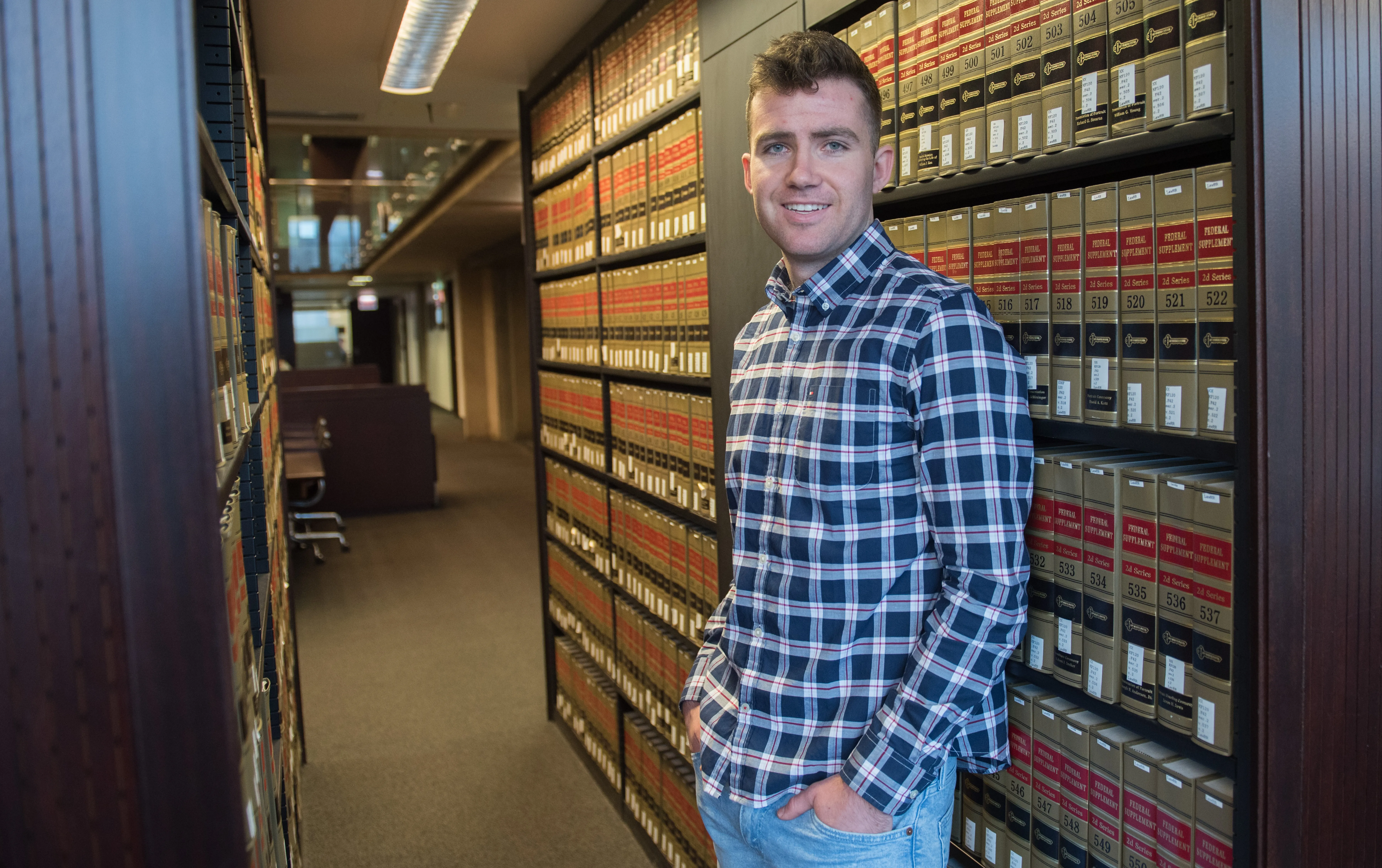Law Student Wins Marshall Scholarship

Christopher Crum, ’20, is among two University of Chicago students who have received Marshall Scholarships to pursue graduate studies in the United Kingdom next fall. Sarah Nakasone, a fourth-year student in the College, was also selected.
Announced Dec. 3, the highly competitive national scholarships will enable 48 American students to study in the United Kingdom in any field of their choosing. Twenty-seven people affiliated with the University of Chicago have now won a Marshall Scholarship since 1986.
Crum intends to use the Marshall Scholarship to examine how governments can use law to combat threats that the internet poses to individual privacy, the integrity of elections, and quality of public discourse. He will take two years away from the Law School and then return to finish his final year.
“I plan to study the relationship between privacy, democracy, and the common law, on the assumption that legal systems have the ability to increase or decrease, and thereby control, the amount of privacy an individual has—and, by extension, regulate that individual’s role in a democratic system,” Crum said, adding that figuring out how to deal with the downsides of the internet will be “the political question of my generation.”
A global studies major, Nakasone plans to pursue a career in disease control and prevention, specifically looking at how to better engage women in HIV sexual health programs—work that was first inspired by her research at UChicago and abroad. She will pursue two degrees: a Master of Science in control of infectious disease from the London School of Hygiene and Tropical Medicine, followed by a PhD in epidemiology and population health from University College London.
Crum will pursue a master’s degree in the social science of the internet at the Oxford Internet Institute. The institute, he noted, is at the forefront of research on some of today’s most pressing internet-related concerns, including identifying falsified news content using something called blockchain technology, a decentralized system of verifying and tracking information accuracy.
“If fake news could be removed from public discourse and elections could be electronically safeguarded, it would go a long way towards restoring public faith in the democratic systems in the U.S.,” Crum wrote in his Marshall application. “As an American citizen, I feel as though I have an obligation to pursue that end as far as I can.”
During his two years, he also hopes to explore how legislation and the common law system might approach internet regulation in a productive way.
“We are immensely proud of Chris for bringing his powerful intellect and stellar work ethic to bear on these complex and pressing questions, which are fundamental to the future of our society and democracy,” said Law School Dean Thomas J. Miles, the Clifton R. Musser Professor of Law and Economics. “The Marshall Scholarship is both an honor and an opportunity, and we look forward to seeing how Chris’s time at Oxford shapes his inquiry. We also look forward to welcoming him back to the Law School at the end of his two-year study at Oxford.”
Law School fuels questions about internet
In many ways, Crum’s interest in law and the digital commons has been building for years.
As an undergraduate at Bates College in Maine, where he majored in history and minored in philosophy, Crum wrote a thesis on the ways in which European powers tried build their maritime empires by claiming ownership of the ocean. It’s a concept, he argued, that served as an early foundation for modern-day ideas about ownership, including intellectual property. The paper won the Ernest P. Miller Prize for the most outstanding history thesis.
The summer before starting law school, he interned at the Berkman Klein Center for Internet and Society in Cambridge, Mass., where he studied online free speech and digital copyright. He was troubled by claims of proprietary ownership on the internet commons, which he saw as “a drag on the creative promise that the internet represents.”
Law school only fueled his many questions about the digital commons. In his Elements of the Law class, he debated how to balance free speech with interests in regulating fake news. In his Property class, he thought about privacy, individuality and nuisance law. As a staff member on the Chicago Journal of International Law, he worked on a student comment that focused on appropriate institutional design for dealing with the downsides of the digital commons.
“UChicago, more than anything else, gave me the confidence I needed to apply for the Marshall Scholarship,” Crum said. “Being here in a community full of some of the smartest students and professors in the country normalizes aiming high. Moreover, my Hyde Park experience has given me a renewed appreciation for institutional choice and design. More specifically, if it's inevitable that the internet is going to be more regulated in the future, it remains integral to determine whether the regulators should be private or public, something the state’s choices go a long way in determining. UChicago has highlighted that crucial point.”
Crum, who will be working on data-privacy cases this summer at Ropes & Gray LLP, hopes to build a future career first in legal practice and, ultimately, in political advising.
He said the Marshall Scholarship represents “an amazing opportunity to pursue my research interests”—and is one that he hopes will make him a “better, more informed lawyer when I come back to finish my JD.”
Both Crum and Nakasone secured University nomination and received application support from the College Center for Research and Fellowships, which guides candidates through rigorous processes for nationally competitive fellowships. Additional support is provided by the UK/IRE Awards faculty nomination committee; its ongoing service is a critical part of student success at the national level.
To read more about Nakasone’s work, please visit the full story on the UChicago News site.
